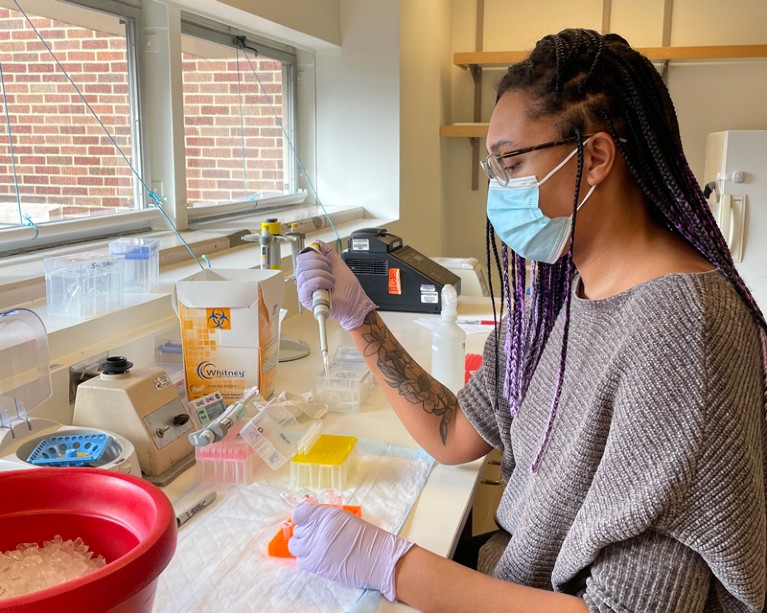
Ashley Paynter at a Black Lives Matter rally in Seattle, Washington.Credit: Maile Anderson
Often, departments in research universities recruit students of colour by offering a highly manufactured dream, a guise of equity and inclusion. But many of those students eventually come to find that they are being used as a tool to aid in departments’ illusion of equity, which generally serves to benefit the department and individual faculty members, not the students.
Antiracism cannot be diluted to a simple increase in representation of students of colour. The importance of genuine investment in equity at the institutional level became more apparent to me after participating in the Black Lives Matter protests held in response to the murder of George Floyd by police in May 2020. It was arduous to reconcile my place in academia and return to the laboratory setting after all I had seen transpire in the streets. I felt as though I was at an intersection, grappling with a double consciousness of both of my identities, as a scientist and as a Black woman. How could I ethically continue to work in lab settings while my mind was infiltrated with images of my people being brutalized in the streets and on social media every day? How could I continue to protest while my research was demanding my time and attention? But even more importantly, how could I have a meaningful relationship with science in a way that made me feel dignified?
In response to both the racial tension in the United States and my deep love for science and education, I started the Decolonizing Science podcast in December 2020. My aim is to amplify the voices and experiences of Black and Indigenous scientists and others who have been hurt by inherently racist medical and educational systems. By delivering clear and inclusive interviews and organizing local rallies, I hope to combat scientific illiteracy, health inequity and systemic under-representation. As a Black scientist, I want to educate communities on how science, academia and health care can be improved through the lens of antiracism.

Decolonizing science toolkit
I have at times struggled with conflicting senses of identity and duty. This is mainly because my relationship with being Black in academia is complex. Science makes me feel alive — it allows me to ask questions and investigate our world and species in new and dynamic ways. However, the freedom that scientific thought allows me is often diluted by the discomfort of being Black in historically white-centred environments. Unfortunately, when pursuing higher education, the experiences of students of colour are often riddled with microaggressions and with the dismissal of race- and equity-related conversations. As an activist, I worried that merging science with the fight against racism would be deemed inappropriate or unnecessary, as I had been conditioned to believe my entire life. Despite this, I came to find that my dreams of being a scientist were inherently intertwined with Black liberation.
Decolonizing Science has allowed me to solidify and strengthen my confidence as a Black woman and as a scientist. I’ve become a more equitable and ethical scientist by extending the accessibility of science to a wider range of people. I can apply my education where it is most needed: teaching listeners something new, advocating for families affected by medical racism, distributing food and personal protective equipment to homeless people in Seattle and mentoring young Black women. By sharing interviews that educate listeners about how academia and health-care systems can harm people of colour, I hope that we might one day improve these institutions.
Although hopeful for the future, I worry that some attempts to make academia more equitable could be misguided. I have had many colleagues say to me: “Academia needs more people who look like you.” As much as the sight of more scientists of colour is satiating, the priority should be the quality of life, well-being and appreciation of these scientists. Until academia confronts its systemic inequities, brilliant students of colour with the potential to unequivocally enhance science will be deterred. Below are some key steps that I wish institutions and employers would take to build truly respectful environments for students of colour.
Representation on its own will not be enough to undo racism’s harms
Table of Contents
Those committed to equity should understand that the harm of racism cannot simply be ‘undone’. The ramifications of colonization, enslavement and segregation penetrate almost every aspect of our society, including our education systems. Merely boosting representation is not an effective way to increase equity in predominantly white institutions. In my own experience, it has been tokenizing and, frankly, degrading.
Instead, institutions should focus on improving the quality of life of these students. One concrete action they could take would be to hire a trained diversity officer, an expert who can give faculty members and students resources to help facilitate and sustain truly inclusive environments. This also takes the burden of this work off the shoulders of researchers of colour. A second concrete action would be to increase departmental funding for students’ mental health care, and to direct students towards resources outside the department. Students of colour want to be treated as humans, not as props for onlookers, grant applications or self-validation. Equal representation and equity are not the same thing. Optics will not liberate us; structural change will.
Do not appoint yourself as an ally
Giving people access to education is a human right, not an excuse to pat yourself on the back. Students of colour who enter graduate programmes are just as highly qualified as any other student, plus they have had to deal with the weight and pain of racism from the day they were born. They will continue to feel this weight in new and overwhelming ways as they continue their career. Decentre yourself by approaching student interactions with empathy, humility and respect for their valuable expertise.

Ashley Paynter argues that PhD students of colour need to have their voices heard and amplified by departments and faculty members.Credit: Ashley Paynter
That said, do not assume that a student’s presence in an institution automatically means that the student is comfortable. It would be much more productive to ask them directly whether the academic environment feels like a safe space. Initiate communication with them about how they feel in the institution, department or research group without judgement and with their consent. This not only gives the student space to share criticism, but also reinforces that their experiences are valid and important. You do not get to declare a space ‘safe’ if you do not have a legitimate connection with, and compassion for, the members of your environment.
Take risks to make environments more comfortable
To be an effective mentor and advocate for students of colour, you must first acknowledge your privilege. Then, you must use that privilege to fight for structural change. There is no equity if those in higher ranks are not willing to sacrifice their power and potential reputation for the sake of dismantling systems that were established by white supremacy. You heard me correctly — if you are not dedicated to putting the well-being of your students of colour before your colleagues’ perception of you, then your cries for equity are merely self-serving and performative. You can’t advocate for equity with empty promises or slight gestures — you must make tangible improvements. One way to do this would be to seek students’ suggestions on how to improve the department’s culture, then raise those suggestions in faculty meetings, even if the opinion is unpopular or polarizing. Student groups around the world have outlined ways that institutions can make actionable change, but are often ignored. As students, we rely on faculty members to advocate for us.
Give your students permission and the freedom to be advocates
This is potentially the most concrete way to show students you are committed to equity: let them fight for what they believe in. Students are multifaceted, and every student’s path while pursuing a PhD is different. Departments need to deconstruct what they currently assess as ‘valuable work’. Deeming racial-equity work disruptive or unprofessional is harmful because it leads to a scientific field that is less accessible, less inclusive and less attainable.

‘Beyond anything I could have imagined’: graduate students speak out about racism
As a Black student, my work in antiracism and science communication is a fundamental part of my well-being and my community’s well-being. Joining a graduate programme does not mean that I sign away my identity, dignity or autonomy. If departments truly value diversity, why punish students for bringing in their diverse backgrounds? This work should be celebrated and respected because it is fundamental to a more prosperous and inclusive scientific community.
Understand that this is not an attack
Sometimes the best action item is to listen. Good intentionality alone does not equal actionable change. Sometimes, would-be helpers say and do the most harmful things to students of colour. This is why having hard conversations about racism and your contribution to it can be emotional and complicated, but the health and prosperity of departments and institutions depend on facilitating this change. Let’s apply the rigour of science to the facts of systemic racism and the damage it inflicts on scientists of colour.
This is no easy task — it means removing ego from conversations about racism and dismantling power dynamics that have become all too familiar in academia. Even more importantly, we as a scientific community must examine what the ramifications are of perpetuating a culture that systematically ignores the voices of students of colour while preaching equity.
Ask yourself honestly: what are you willing to do to make science more equitable, and in doing so, whose voice must be centred?
